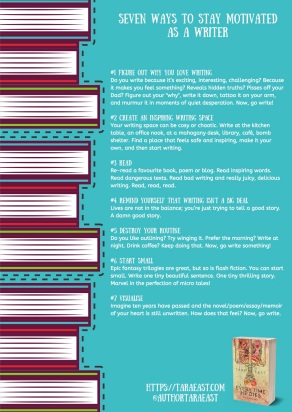I was recently listening to a writing podcast where the interviewee stated that she read three hundred books last year (not including re-reads). When the interviewer asked her how she did that, the interviewee responded, “I don’t watch TV.”
Now, I rarely watch TV and I didn’t read three hundred books last year.
In fact, I only read a pitiful thirty-eight books last year (you have no idea how much courage it took to write that!); a tally I find incomprehensible because it seems like all I do is read and write.
It would be easy to rationalise my short list by claiming that I am a slow reader, or that I spent most of last year writing, but that river is called denial.
Here are the two real reasons why I read fewer than forty novels last year:
- I only read before going to sleep.
- I chose to do other things instead.
I know I am not alone on this front. In fact, it’s reasonable to say that most writers need to read more.
I’ve talked at length about the benefits of reading before, but for the sake of argument (and because we all need a reminder from time to time), here they are again.
Reading:
- Improves you vocabulary
- Improves recall
- Improves brain function
- Prevents the onset of Alzheimer’s
And that’s just the body, let’s cover some of the ways that reading improves your writing.
Reading shows you how to:
- Create characters
- Create a plot
- Write dialogue
- Write prose
- Create narrative tension …
Basically, reading books shows you how to write books.
Now that you got your why, it’s important that we cover the how. How (the hell) do you read more books?
Read with a pen in your hand
Think back to when you were first learning to read, what did you do?
Chance are you, your parent/guardian, or teacher underlined the sentences with their finger as you read aloud.
You need to go back to this method.
If you trace each sentence with a pen or their finger as you read them, you will read twenty-five percent faster.
Why? In part, because it is easier for your eye to follow the moving pen than the stagnant sentence. This method allows you to focus on each word and your eyes don’t have to work as hard to ‘keep their place’ on the page.
Alternatively, you can hold a card under each line and move it down the page as you read.
Stop it with your subvocalisation
Subvocalisation is the habit of reading in your head as though you were reading aloud. Rather than saying each word in your head, allow your eyes to run over the line as your brain connects these words together and creates meaning.
For example, if you read the phrase “see you later” you don’t need to read each word individually in order to decipher the meaning because this phrase is so familiar.
This technique will quicken your reading pace because your eyes will be traveling along each sentence faster.
Note: If you are trying to improve your writing, or if you are analysing a text for a particular reason, then avoid this method. Speed reading is only useful if you want to pull the guts out of a book quickly. It is not so useful if you are trying to develop your understanding of craft by analysing how other authors create character/tension/beautiful prose.
Take a book everywhere
There are many tiny gaps in our day that could be filled by reading. Yes, there are the obvious ones like waiting in the doctor’s office, but there are also those unexpected moments, like waiting outside your child’s school at pick-up time, or the ten minutes before a meeting starts (and the room is still empty).
When you have a book on hand, you can dip into the story whenever you find yourself caught in an idle moment.
Imagine this: instead of reaching for your phone while you wait for your partner to get ready, for the fish and chip owner to call out your number, or for the kettle to finish boiling, you opened a book instead. Magic.
Read more than one book
This may seem counter intuitive. You may think it’s better/faster to read just one book at a time, but oh, dear friend, that would be such a terrible mistake. I believe (as does Gretchen Rubin) that it is far better to have multiple books on the go.
Why?
Well, because it pretty much eliminates the excuse of “I don’t feel like reading that.”
If you have two (three, four, five) books on your night stand, chances are there will always be something you’re in the mood for. And if you’re worried about getting stories confused, don’t stress. Simply make sure that you are reading a variety of texts and that you aren’t reading two (or more) books within any one genre.
Hello, audiobooks!
I am yet to jump on the audiobook bandwagon, but even from my distant vantage point I can see the benefits of this format: audio books are mobile. Audiobooks eliminate the biggest compliant readers have about reading: time.
You don’t have to find a spare thirty minutes in your day to get your reading done; now, you can plough through those pages while you are exercising, cleaning, or commuting.
This one tip alone will have you powering through your TBR pile quicker that you can download a podcast.
This year, I’ve promised myself that I will read at least forty books. This may seem like a low number, but I wanted to set something that was realistic, but also just challenging enough.
To date, I’ve read one book every week (fourteen so far), so I am currently on track to meet my goal; and believe me, I will definitely be putting the above tips to practise.
Now, I’d love to hear from you. How many books did you read last year? Are you happy with that amount or would you have liked to read more? Got any tips to share on how to make more time for reading? If so, please leave a comment below!
GRAB A FREE COPY OF SEVEN WAYS TO STAY MOTIVATED AS A WRITER

While you’re here, be sure to join my email newsletter and gain instant access to your FREE downloadable copy of the Seven Ways to Stay Motivated as a Writer. Plus, you’ll receive my weekly newsletter straight to your inbox every Thursday morning. This is where I share links to my latest blog/vlog, updates and other exclusive content that I ONLY share via email.


Great read! I used to have a fear of reading books because I was afraid I’d discover they had the same idea that was in my head that I wanted to write about and/or I didn’t want to write about something with another author’s words in my head. I’ve finally given up that and have been enjoying reading. I put myself on a book a week but it’s been more like a book a month. I’ll try the two at a time thing. Audio books are wonderful, I’ve gone through dozens. I’ll be curious of your thoughts on those who consider it appropriate to say they’ve “read” something after listening to the audio version, if you do get more into listening, lol. 😜
LikeLike
Hi Mandy,
Thank you for taking the tip to leave a a comment. For me personally, I do believe that listening to audiobooks counts as “reading”, but I also understand why some people would disagree with that. Depending on how busy your life is, reading one book a month (especially if it is a big book) seems quite normal. I do find that you have to be very diligent to read one book a week and the one trick that makes the biggest difference here is to read during those odd pockets of time when you would normally reach for your phone.
I absolutely understand your hesitation to read while writing, many authors would agree with you here, but I am glad you have found away around it. My advice (not that you are asking for it!) is to read books that are either from a different genre or that deal with a different topic or theme than your WIP.
Have a great day and thanks again!
LikeLike